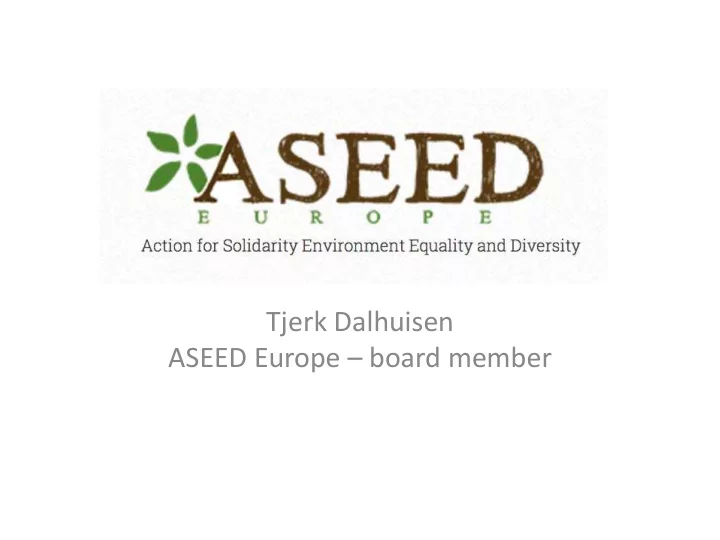

Tjerk Dalhuisen ASEED Europe – board member
Pesticides • Called ‘Agricultural poison’ when I was young • Industry changed that into ‘crop protection’ • But healthy crops don’t need protection • Healthy crops protect themselves
The impact of pesticides • Today extremely widespread use • Some 3 million tons applied in 2017 • $ 60 Billion a year worldwide • Unprecedented damage to human and animal health, environment, climate and biodiversity
And the damage? • $ 11,4 Billion profit in pesticide sales (2014) • Polluters do not pay for the damage – not yet • Society, nature, environment pay the cost That’s you and me
Impact of pesticides on life • Thanks to independent research we know the impact of pesticides on biodiversity and soil, health and especially the young and unborn • Endocrine disruptors can cause vital damage in an extremely low dose: • Most pesticides are endocrine disruptors
Industry lobby • Present pesticides as harmless • Myth: ‘necessary to feed the world’ • Weaken and influence regulation • Attacking independent scientists • Asbestos, tobacco, chemicals, pesticides
The Green Revolution • Widespread monocultures, growing on artificial fertilizers and many times doused with pesticides • Most of these crops are for animal feed, sugar and agro fuels: soy, corn, beets, canola • In Argentina they call it the green desert: nothing lives there except the monoculture plants • Nature is gone, those who live next to the fields are poisoned and suffer illness and birth defects
The pesticide paradigm • Reduce the soil to dead substrate • Add the chemicals you like • Kill everything you don’t like • Concentrate power in a few big companies • Philosophy of war by the companies of war
Agriculture at a crossroads • The current model is not sustainable : it is exploiting and poisoning the earth, affecting climate and biodiversity • It has negative impacts on fertile soil, the very thin layer of the earth that societies depend upon • The UN estimates that in the current pace of erosion and soil destruction we have 60 years left • IAASTD (2008): Agro-ecology the way forward
Moving forward: paradigm shift All over the world millions of farmers and thousands of scientists show: • – The change towards a more diverse and inclusive system – Use local resources whenever possible – Stop the war against nature, stop working with death as a basis – Work with nature and with life as a basis – Share knowledge and experience – Appreciate the abundance of nature We can do much better You students have an important role to play
And Syngenta? They cause huge damage to the world every day. • They should be held accountable for the damage to our planet. Be put on • trial for violation of human rights and ecocide. Is Syngenta really that bad? Don’t they do quite a few nice things? • Syngenta might employ some very friendly people who sincerely believe • that they can help the world. But Syngenta’s business model is selling pesticides and patented seeds. • The more profit the better - for them and their shareholders Not for the world
Some facts about Syngenta • Bee-killers: Syngenta and Bayer are the main producers of neonicotinoids (‘bee-killers’) • Paraquat: banned in EU, massive sales elsewhere • Silencing the scientist, the case of atrazine (banned in EU) • Industry lobby groups FEFAC, ECPA, ERF etc. lobbying for less regulation and to weaken precautionary principle • Syngenta merged with ChemChina ( State of China)
Conclusions • Pesticides companies are fossiles, based on paradigm of the past: floating on oil, death and a very narrow view • Improving agriculture + health + biodiversity + diversity = phasing out pesticides • Scientific Study should not only for your own salary and the profit of a small group of shareholders • Science could be for the sake of all , a science of life where humans are not trying to dominate nature • Advanced and much broader view
Some references • Agriculture at a Crossroads, IAASTD (2008) • Wake up before its too late (UCTAD 2013) • Report of Special UN Rapporteurs on the right to Food and on hazardous substances (2017) • ETC Group: Who will feed us (2017)
Recommend
More recommend